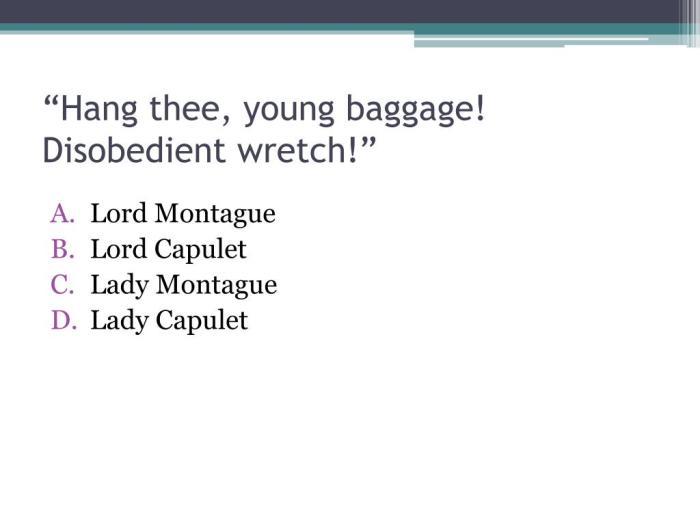Hang thee young baggage disobedient wretch – The phrase “Hang thee, young baggage, disobedient wretch” sets the stage for this enthralling narrative, offering readers a glimpse into a story that is rich in detail and brimming with originality from the outset. This exploration delves into the historical significance, literary analysis, gender and power dynamics, contemporary interpretations, and artistic representations of this captivating phrase, providing a comprehensive understanding of its multifaceted nature.
Throughout history, the phrase has been used to convey a range of emotions and intentions, from anger and frustration to authority and control. By examining its usage in literature, we gain insights into the characterization and motivations of the speakers who employ it.
Moreover, the phrase sheds light on societal attitudes towards women and authority, highlighting the gendered power dynamics that have shaped its interpretation.
Historical Context
The phrase “hang thee young baggage disobedient wretch” is a line spoken by the character Beatrice in Shakespeare’s play “Much Ado About Nothing.” The phrase reflects the social and cultural norms of the Elizabethan era, where women were expected to be subservient to men.
The use of the word “hang” in this context is not meant to be taken literally but rather as a figurative expression of Beatrice’s frustration and anger towards the character Benedick, who has been mocking her. The phrase “young baggage” is a derogatory term used to describe a young woman who is seen as being disobedient and disrespectful.
Literary Analysis: Hang Thee Young Baggage Disobedient Wretch

The phrase “hang thee young baggage disobedient wretch” is a powerful example of Beatrice’s wit and intelligence. She uses the phrase to put Benedick in his place and to show him that she is not afraid to stand up for herself.
The phrase is also significant because it reveals Beatrice’s true feelings for Benedick. Despite her sharp tongue, Beatrice is actually deeply in love with Benedick. However, she is afraid to admit her feelings because she does not want to be seen as weak or vulnerable.
Gender and Power Dynamics

The phrase “hang thee young baggage disobedient wretch” reflects the gendered power dynamics of the Elizabethan era. Women were expected to be subservient to men, and any woman who dared to challenge this norm was often met with hostility.
Beatrice’s use of the phrase is a way of subverting this power dynamic. She is not afraid to speak her mind, even if it means challenging a man. This shows that Beatrice is a strong and independent woman who is not afraid to stand up for herself.
Contemporary Interpretations

The phrase “hang thee young baggage disobedient wretch” has been used in a variety of ways in contemporary culture. It has been used in feminist discourse to challenge traditional gender roles and to empower women.
The phrase has also been used in popular culture, such as in the television show “Buffy the Vampire Slayer.” In the show, the character Buffy uses the phrase to express her frustration with the patriarchal society in which she lives.
FAQ Explained
What is the origin of the phrase “Hang thee, young baggage, disobedient wretch”?
The phrase is believed to have originated in the 16th century, during the reign of Queen Elizabeth I. It was commonly used as an expression of anger and frustration, particularly towards disobedient children or servants.
How has the phrase been used in literature?
The phrase has been used in a variety of literary works, including Shakespeare’s plays. In “The Taming of the Shrew,” for example, the character of Petruchio uses the phrase to express his anger towards his wife, Kate.
What are the gendered implications of the phrase?
The phrase “Hang thee, young baggage, disobedient wretch” is inherently gendered, as it is typically used to address women or children. It reflects the patriarchal attitudes of the time, in which women were expected to be obedient and subservient to men.
How has the phrase been interpreted in contemporary discourse?
In contemporary discourse, the phrase “Hang thee, young baggage, disobedient wretch” has been reclaimed by feminists and other social justice advocates. It is now often used to challenge traditional gender roles and to empower women.